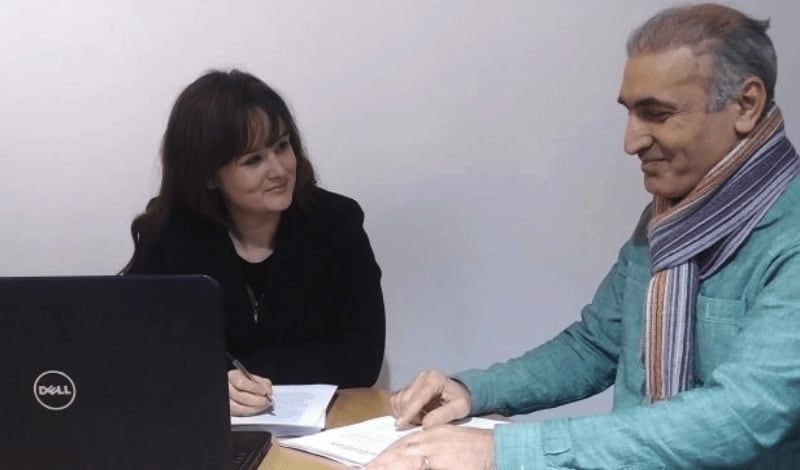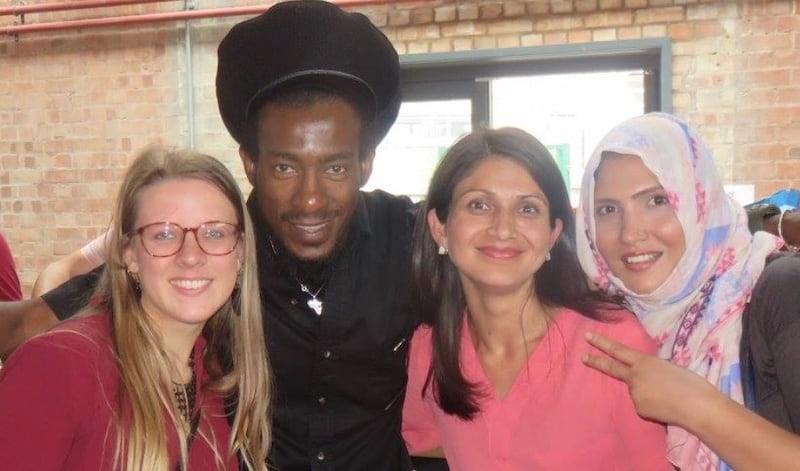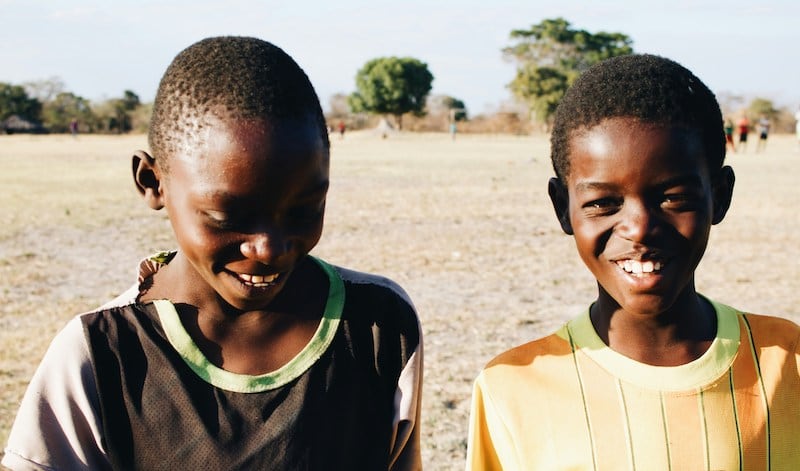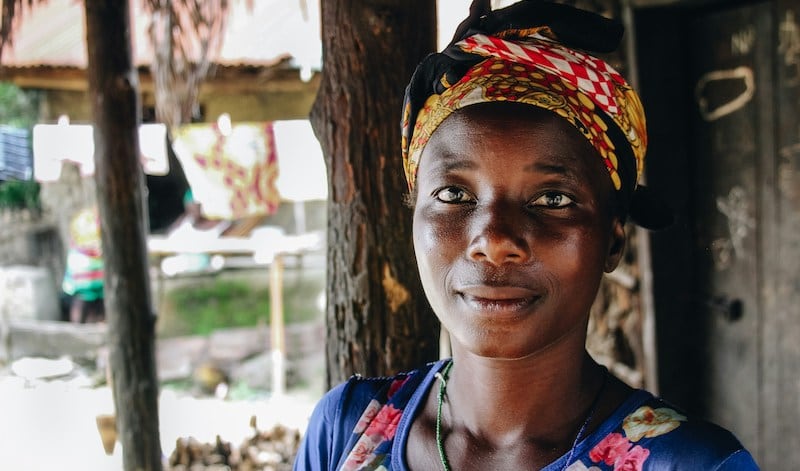What Entraide does
We provide advice, guidance and practical support to refugees,
asylum seekers and vulnerable migrants in Solihull and the
wider Birmingham area.
Casework Advice and Support
Our Caseworkers provide advice, guidance and practical support to refugees, asylum seekers and vulnerable migrants in Solihull and the wider Birmingham area enabling them to access social provisions, education and health services through advice, advocacy and one-to-one support. This is achieved through office-based sessions, outreach services and home visits. Entraide is also registered with OISC to provide regulated immigration advice at Level 2 Asylum & Protection and Level 1 Immigration.


Support for Ukrainian Refugees
Since the beginning of the War in Ukraine, Entraide has been supporting Ukrainian refugees arriving in Solihull and the surrounding area. We are providing destitution support, casework and integration activities to enable them to rebuild their lives in the UK. We also provide ongoing advice and support to those in temporary accommodation and other placement arrangements as well as supporting Solihull householders who are hosting Ukrainian refugees under the Homes for Ukraine Scheme.
Befriending Service and Support
The aim of our befriending service is to mitigate the impact of loneliness by providing companionship and reliable relationships through volunteer befrienders. Newly arrived or isolated refugees and asylum seekers are matched to local volunteers who offer informal support with advice and encouragement on how to get involved with wider activities within the community, helping them to better find their bearings and become better integrated into unfamiliar surroundings.


Children and Family Activities
We offer a wide range of leisure activities such as games, trips and art & crafts. These encourage children and families from migrant backgrounds to take part in activities they enjoy whilst enabling children to improve their school attainment, socialise and build their confidence.
Our Training Programme
We deliver training to Children’s Social Services and any other professionals involved in the care of Unaccompanied Asylum-Seeking Children (UASC).
We currently offer the following courses:
- Introduction to Working with Unaccompanied Asylum Seeking Children
- Triple Planning (Pathway Planning for Young People who came to the UK as Unaccompanied Asylum-Seeking Children)
- Age Assessment
Our training is delivered online via Zoom.

Our Courses
Course 1: Working with Unaccompanied Asylum-Seeking Young People
Course Aims:
This is an introductory course for all those who are involved in working with or supporting unaccompanied asylum-seeking children and care leavers, including managers, social workers, personal advisors, support workers, independent reviewing officers and foster carers. The course covers law, policy and processes affecting asylum-seeking children and young people, focusing on unaccompanied children who are looked after and care leavers. Participants will gain an understanding of these children’s particular needs and vulnerabilities as well as a practical understanding of how to support them across different areas: the asylum and immigration system, trafficking, age assessment, care and support including transition at 18 and 21, and access to education.
Learning Outcomes:
- To become familiar with who is an unaccompanied asylum-seeking child, why they leave their countries of origin their journeys to the UK and the ways that they may come to the attention of the local authority;
- Understanding the asylum process, access to legal representation and possible outcomes and implications for Care/Triple Pathway Planning.
- To consider immediate safeguarding issues when responding to unaccompanied children, including issues around trafficking, concerns about possible exposure to radicalisation and age disputes.
- Care planning for unaccompanied children, including placement options, health needs, religious and cultural considerations.
Course 2: Triple Planning
Course Aims:
This course is for all those who are involved in working with or supporting unaccompanied asylum-seeking children and care leavers, including managers, social workers, personal advisors, support workers, independent reviewing officers and foster carers, who will be involved in undertaking needs assessments and pathway planning. The course covers relevant legislation and best practice, as well as proposed changes to leaving care support for UASC contained in the Immigration Act 2016, Nationality and Borders Act 2022 and the Illegal Migration Act 2023. Participants gain an understanding of how to plan for the three possible outcomes for those with uncertain immigration status beyond the age of 18, including considerations when undertaking lawful assessments of educational need, and best practice when preparing young people for return to country of origin.
Learning Outcomes:
- Become more aware of how to address the care needs of unaccompanied young people in the context of the wider asylum and immigration legislation, and how these needs change over time.
- Gain a better understanding of the impact of immigration status on access to public funds at 18, including benefits and accommodation.
- Gain a better understanding of leaving care entitlement for UASC care leavers aged 18 to 21, and post 21 in line with the new Children and Social Work Act 2017 (including the conflict between Leaving Care Legislation and Schedule 3 of the Nationality, Immigration and Asylum Act 2002).
- Consider how to undertake lawful assessments of educational need which comply with the Kebede Judgement (2013) and the Nfuni Judgement (2013).
- Be able to consider contingencies for durable and best interest plans for young people who are likely to return to their country of origin.
Course 3: Age Assessment
Course Aims:
This course is for all those who are involved in working with or supporting unaccompanied asylum-seeking children who will be involved in undertaking or overseeing the completion of age assessments. Participants will gain an understanding of the relevant guidance and case law required to equip social workers to make lawful, fair and sensitive age assessments. The course will offer practical advice on preparing for, and conducting age assessments, as well as a range of useful resources covering issues such as trafficking, trauma and memory, to ensure that social workers have the tools they need to make sure that children who require protection receive it.
Learning Outcomes:
- To understand why age is an issue and become familiar with the legal context for age assessment.
- To increase awareness of recent guidance in relation to completing age assessments.
- To consider how to undertake a lawful age assessment.
- To become more familiar with analysis of information gathered.
- To gain greater awareness of the issues that may arise as a consequence of age assessment.
- To become familiar with what to do with a completed age assessment.
To book a session or discuss a bespoke or in-house training, please contact Felix Kupay on 07948 602313 or email: [email protected]
Independent Age Assessments for young people
Entraide has trained and experienced social workers that complete Independent Merton complaint Age Assessments on behalf of local authorities. We can provide two social workers that will complete the assessment or one social worker that will work alongside the social worker from the responsible local authority to complete the assessment.


Appropriate Adult Service
Entraide offers an Appropriate Adult service to local authorities who are conducting Age Assessments with children and young people. Our Appropriate Adults are all qualified social workers who are registered with Social Work England and have extensive experience of working with unaccompanied young people as well as completing Age Assessments.
The role of our Appropriate Adults is to ensure that children and young people who have had their age disputed understand what is happening and why an Age Assessment is being completed, as well as ensuring that they understand their rights and are fully included in a fair Age Assessment process. Our Appropriate Adults will advocate on behalf of the child or young person, represent their best interests, and ensure that their welfare needs are met during the interview process.
For more information, please contact Felix Kupay on 07948 602313 or email: [email protected]
Work experience for young people 15 – 18-year-olds.
Entraide offers the opportunity for young people to apply their classroom learning without the pressure and responsibility of paid work. This would also enable young people to explore potential career paths and provide them with valuable work experience, whilst developing transferable knowledge and skills for the future.

Projects in Africa

Since 2013, we have been working with educational authorities, community leaders and parents to increase access and improve the quality of education in the Democratic Republic of Congo.
Our priority areas:
- Investing in school infrastructures including water and sanitation within school environment.
- Supporting children from deprived background, especially orphaned and disabled children to enrol and stay in education;
- We support schools to improve safeguarding children’s policies and practices, etc.
- Our project also supports a girl child to transition from primary to secondary school.
- Teacher training and improving the management of schools.
- Support for street children in Kinshasa
Our Achievements
- a three years’ project (June 2014- June 2017) helping 1500 disadvantaged children access and stay in education as well as to improving the quality of primary education in Ganaketi, in the Province of Kwango,
- the construction of Kifilu Mbunda Primary School between April 2019 and March 2020 (See Pictures of Kifilu Mbunda Primary School Before and After the Project)
- the construction of Tuvukana Primary School between February 2021 and February 2022 (see photos of new build here Tuvukana Primary School Photos)
- a project supporting 100 girls to start primary education or transition from primary to secondary education in the area of Ganaketi as well as training teachers in girl-friendly teaching methods.
For more information about our Africa Programme or if you would like to support this work, please contact Felix Kupay by email at [email protected]



